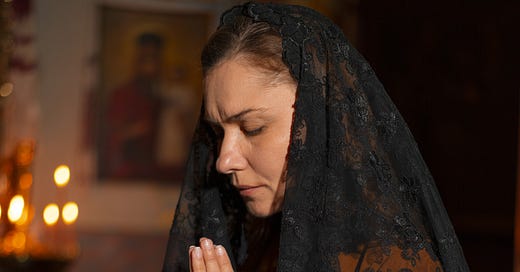A Return to Tradition in Godless Europe
Things will get interesting once the generational shift happens
Image by Freepik
Civilizational renewal was the theme of one of the ARC (Alliance for Responsible Citizenship) panel discussions in London on 17-19 February. Created by Jordan Peterson as a kind of anti-WEF, the conference attracts a motley crew of disgruntled liberals, IDW types and conservatives.
New atheism is out and the panel talked about the central role of Christianity in the West’s foundations as well as the need to embrace Christianity to revive the culture. Authors such as the American social psychologist Jonathan Haidt have previously written about the positive benefits of religion in terms of group cohesion and individual well-being in The Righteous Mind, so something is changing in how intellectuals approach the topic.
However, according to conservative commentator Auron MacIntyre, the ARC panel failed in its lacklustre response to a question from the audience, which said “European nations are seeing a vast influx of Islam, how can we have Christian civilizational renewal in these circumstances?”
The speakers of the panel replied that “Christian civilisation is over,” reported MacIntyre. “You will never be majority Christian again. They all agreed plurality is the only way forward and suggested Islam’s inability to lead peacefully would mean it loses in the marketplace of ideas,” wrote MacIntyre, adding “absolutely cooked.”
This response isn’t surprising considering that the conference took place in Europe and not America, as the secularisation of Europe is far ahead of America. When even acknowledging the centrality of Christianity to Western culture is controversial, it is perhaps no wonder that the panel was unable to come up with more compelling ideas on how to defend it.
It may come down to a generational issue. MacIntyre himself noted that there was a contrast between the panel and the energy and politics of people under 45 at the conference.
This shift mirrors Gen Z’s attitude towards religion, even in secular Europe experiencing a steep decline in Christianity. According to a 2023 Ipsos survey polling 19,000 people in 26 countries, Gen Z practises religion more than the Baby Boomers in secular countries.
People under 26 pray more than the Baby Boomers in Germany (+28%), Sweden (+23%), France (+16%) and Great Britain (+15%). The difference is also clear in terms of religious attendance, with a gap between Gen Z and Baby Boomers: Sweden (+34%), Germany (+28%), Great Britain (+22%), France (+21%), Belgium (+14%), Hungary (+11%), Netherlands (+10%).
In the UK, 62 percent of Gen Z describe themselves as spiritual, while just 13 percent see themselves as atheist, according to research by OnePoll.
In France, a record-breaking amount of adult baptisms to Catholicism took place in 2024, with 36 percent of these in the age range between18-25. Before that there had also been an increase for the cohort between 26 and 40. Last year’s pilgrimage to Chartres, France, included an unparalleled amount of young people who participated.
These findings are mirrored in the US, with The Free Press reporting on young women donning the veil at Catholic services. Meanwhile, First Things writes that many young men are flocking to Orthodox and Catholic services, attracted to “churches that are traditional in liturgy and conservative in doctrine, and that exert a “masculine” appeal. They are taking a pass on mainline and progressive evangelical churches that echo the broader culture’s suspicion of masculinity.”
French priest Matthieu Raffray believes many younger people are seeking faith in part because they’re rejecting the consequences of the student revolts of the 1960s. Raffray tells the French media Frontieres that in his experience, younger people between 18 and 35 have experienced first-hand what liberating all desires means and that they have weighed it and found it wanting. These generations were promised happiness but as the children of Baby Boomer divorces, they’ve seen their countries decline at a cultural and social level.
And so, many younger people woke up and saw the hedonistic program of the 60s as not just an illusion, but a lie, Raffray says. The Baby Boomers didn’t pay the price for their actions but passed the bill to the following generations who feel the consequences of rampant individualism, hedonism and deracination from traditions and collective memory.
Both Raffray and MacIntyre call for a revitalisation of Christianity. With young Christian-curious men, it appears as though this generation faces a choice. While many are rightfully angry at the popularity of the pimp and pornographer Andrew Tate, he offers young men a brutal form of agency over cultural capitulation. But if young men are instead discovering Christianity in which masculinity isn’t considered a problem, but a gift they can use to be of service, it may be a sign of restoration.
The Italian counter-Enlightenment philosopher Giambattista Vico once wrote that once a civilisation starts attacking its founding myths, it cuts itself off from the tree that gives it life. It might bloom for a time, but eventually, it will wither and die.
Europe may be facing a civilisational moment where it can continue walking down the path of endless deconstruction and where the hesitant response of the ARC panel at best slows down the decline. Ultimately, the answers of the ARC panel and that generation aren’t what we should focus on, as the next generation will likely be the one to renew the culture.






This phenomenon is quite noticeable in the United States as well. However, in addition to atheists converting to Traditional Catholicism, there are also fair number of Evangelical converts. I am planning to write an article covering this subject soon.
This is really good - some great links too. Thank you